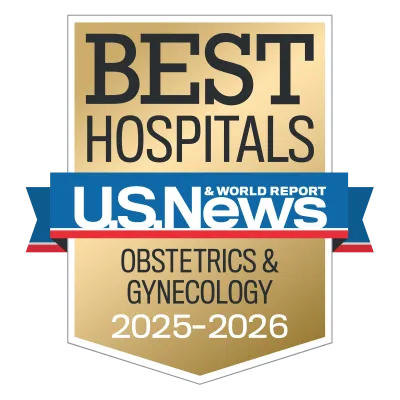Preventive Strategies to Stay Well Ahead
Women’s health screenings are more than just routine appointments. In many cases, it’s a screening that saves a life. Breast, colorectal, gynecologic and lung screenings help catch cancer early, when it’s easiest to treat — even before symptoms start. Learn more about these lifesaving health screenings to take charge of your health today for a healthier tomorrow.

Screening for Breast Cancer
Breast cancer is the second most common type of cancer among American women, affecting one in eight women throughout their lifetime. A mammogram is the most powerful and effective tool available to detect breast cancer at the earliest possible stage before it can spread to other parts of the body.
A few of the main breast cancer risk factors include:
- Being over age 40
- Family history of breast cancer
- Lifestyle choices (obesity, inactivity, smoking, excessive alcohol consumption, excessive red or processed meat consumption)
Talk to your doctor right away if you’re experiencing pain or new symptoms in your breasts. If you need a routine screening, we’re here to make it simple and convenient. Scheduling your mammogram has never been easier, with easy online scheduling, 30-minute appointments, and evening and weekend appointments.

Screening for Gynecologic Cancer
Routine Pap tests and annual pelvic exams help your doctor monitor any changes in your health. They can also identify new symptoms or conditions earlier when they're easier to treat.
A few of the main cervical cancer risk factors include:
- Age
- Being infected with human papillomavirus (HPV) or not having received the HPV vaccine before the age of 26
- Family history of cancer
- Lifestyle choices (obesity, inactivity, smoking, excessive alcohol consumption, excessive red or processed meat consumption)
Talk to your doctor right away if you’re experiencing unusual bleeding, pain, discharge or other abnormal symptoms.

Screening for Colon Cancer
Colorectal cancer is the third most common cancer affecting women. But it’s more than 90% curable if diagnosed early. For women with an average risk of colon cancer, colorectal screenings like colonoscopies should start at age 45 — which is now earlier than the previously recommended age 50.
A few of the main colon cancer risk factors include:
- Being over age 45
- Having Type 2 diabetes, Crohn’s disease, ulcerative colitis, Lynch syndrome or familial adenomatous polyposis
- Family history of colorectal cancer or polyps
- Lifestyle choices (obesity, inactivity, smoking, excessive alcohol consumption, excessive red or processed meat consumption)
Talk to your doctor right away if you’re experiencing unexplained weight loss, blood in your stool, abdominal pain or other abnormal symptoms. Our digestive health specialists offer you more ways to get screened, including traditional colonoscopies and simple at-home tests.

Screening for Lung Cancer
According to the American Cancer Society, lung cancer death rates have declined in recent years — but the rate of women diagnosed has increased within the last 20 years. In most cases, lung cancer doesn’t show any symptoms until it’s more advanced, making screening even more critical.
Lung screenings are recommended for anyone considered high-risk, meaning they:
- Are age 50 or older
- Are a smoker or have quit within the last 15 years
- Have smoked one pack of cigarettes per day for at least 20 years or two packs per day for at least 10 years
Talk to your doctor right away if you’re experiencing breathlessness, coughing up blood or have any other persistent chest symptoms. Our Health Navigators can connect you with a specialist who performs lung cancer screenings like low-dose computed tomography (CT) scans. And if you meet the high-risk criteria, most insurances will cover your lung cancer screening.

Get Personalized Guidance With Health Navigation
Our experienced health care advocates on the Health Navigation Team are registered nurses who connect you with our team of experts and offer guidance and support at every step of the way. We’re here to provide personalized and timely care for any health issue or concern.
Our team works together to help you manage your overall care, including:
- Answering your health care questions
- Assisting with scheduling annual office visits and screenings
- Coordinating your care among multiple providers and facilities
- Finding a physician that fits your preferences and insurance needs
- Sharing resources and support for you and your family

Your Primary Care Partner in Whole Health
Having a primary care provider (PCP) is one of the best things you can do to protect your family’s health. Your PCP becomes your first point of contact for your health care needs, and the relationship you build can benefit you in so many ways:
- Ensures you “know your numbers” (blood pressure, cholesterol, hypertension and diabetes) and can take the right steps to improve them
- Keeps you up to date on your vaccinations
- Knows your health history better than any other provider
- Manages your medications
- Provides referrals to appropriate specialists when needed
- Recommends checkups and screenings to detect health changes or issues
- Treat and manage acute and chronic diseases and conditions
- Treat minor injuries, illnesses and sick visits (cold, flu, allergic reactions)
At your annual wellness visit, your PCP will assess your risk factors for certain health conditions and provide preventive care. Our Health Navigation Team is available to help you schedule your wellness screening with a primary care provider near you.
Pelvic Health Symptoms: Take the Quiz
If you’ve recently had a baby, are experiencing pelvic pain or have other concerning symptoms, our Pelvic Health Program can bring you relief and restore your confidence. Take our quick symptoms quiz to find out how we can help you feel like yourself again.
Our Greatest Achievement Is Caring for You
We have been recognized for our commitment to maintaining high standards of safety, quality and care.

Only National Leader in Greater Orlando
AdventHealth Orlando, which includes nine hospital locations, is the only health care network nationally recognized for women’s care in Greater Orlando.

Nationally Recognized for Patient Safety, Quality and Transparency
The Leapfrog Group has exclusively recognized AdventHealth with the Emerald Award for remarkable achievements and leadership in patient safety, quality and transparency by a health care system, including maintaining a culture of excellence.
Experience Care Designed for You
We’re dedicated to providing a seamless health care experience that focuses on health, wellness, hospitality and convenience. Our Health Navigation team includes specially trained registered nurses who can guide you and help ensure you receive the best treatment available.
Or call us at 407-609-1357.

